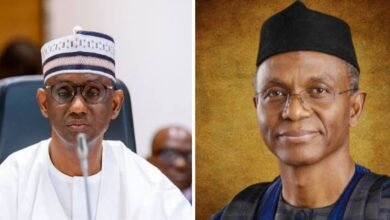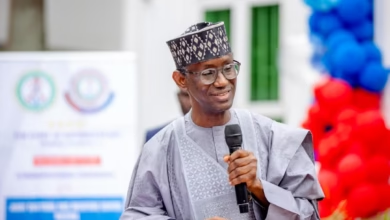
Progress is not an illusion, it happens – George Orwell
The World Bank’s 2020 Doing Business Index (DBI) which has ranked Nigeria 131 out of 190 countries, up 15 places from 146 positions last year, up from 170 since 2014 is a testament to the progress of our nation. For those wondering, the Doing Business Index is an annual ranking that objectively assesses prevailing business climate conditions across 190 countries based on 10 ease of doing business indicators.
This celebrated feat would not have been possible without the much needed reforms implemented by this Administration over the past four years through the establishment of the Presidential Enabling Business Environment Council (PEBEC).
PEBEC has the aim of minimizing the constraints that come with running businesses in the country works towards the fulfillment of the projections of the Economic Recovery and Growth Plan (ERGP 2017-2020), which strives to deliver sustainable economic growth in Nigeria by investing in our people, and building a competitive economy. Some of the strategies that brought about this feat include cutting down the time it takes to register a business through the use of the electronic platform, new grid connections for electricity, upgrading election systems for imports and exports and also educating business owners on vital business strategies.
Since 1995, the Nigerian Investment Promotion Commission Act has taken steps to dismantle years of controls and limits on foreign direct investment (FDI), opening nearly all sectors to foreign investment, allowing for 100 percent foreign ownership in all sectors (with the exception of the petroleum sector, where FDI is limited to joint ventures or production sharing contracts), and creating the Nigerian Investment Promotion Commission (NIPC) with a mandate to encourage and assist investment in Nigeria. The Government has introduced several programmes to boost FDI, notably in agriculture, exploitation and mining, oil and gas extraction, as well as in the export sectors. Tax incentives are granted to pioneering industries deemed beneficial for the economic development of the country and employment of its workforce (such as clothing); allowances facilitating capital investments and the deduction of interest on loans for gas companies are few reforms aimed at promoting public-private partnerships and strategic alliances with foreign companies.
The implementation of various strategies in pursuit of increasing the ease of doing business has had and continues to impacts on entrepreneurs in Nigeria. One of whom is Ola Brown, founder of Flying Doctors Nigeria, a medical emergency services company, whose business has been transformed by the review of the requirements for Nigerian visas in order to make it more assessable and customer-friendly to improve the country’s business climate by the Nigerian Immigration Service (NIS). She disclosed during her interview with CNN how a simple policy change has transformed her business, allowing her the comfort to bring patients to Nigeria without having to get a visa in advance.
Speaking in detail at the Lit Subnational Tour organized by The Presidential Enabling Business Environment Council and the Lagos State Government, Dr. Brown spoke about how the Visa on arrival policy has enhanced her business and ensure better and faster healthcare delivery. “For me, visa on arrival has changed the way my business runs forever. Flying Doctors like every air ambulance service in the world is focused on moving patients from an area where there is an overwhelmed level of care to a more suitable level of care.”
She went further to illustrate the numerous economic opportunities for not just her business but several others catering to the value chain: “imagine trying to move an American or a European that’s had an accident in Chad into a Nigerian hospital, you have to move them to the center of Chad first and wait two days for a visa there while the patient is critical before you can get them into Nigeria. However, now we can fly directly there and bring them straight into Lagos, they get their visa on arrival when they get to Lagos and we can take them to hospital and I will tell you what that does, each of these patients are intensive care patients, they spend around $50, 000 each. So you can imagine if we are bringing one thousand to five thousand of those patients every year into Lagos, It just props up my business. The business services are making money because now they are making money from their charges when they issue visa. The hospitals are making money; the doctors can be paid better salaries. Even sometimes the relatives have to fly in to stay in hotels in Lagos. So it is a really huge boost to the economy.”
Founder of Farmcrowdy, Onyeka Akumah, remarked about his firm’s progress operating from Lagos under a better business environment brought about by the Ease of Doing Business Reforms Policy. He spoke about the strides of the Corporate Affairs Commission, CAC, under the new policy. He said: “When investors are coming into the country, it’s a lot easier for them to locate on their phone where the organization is across the country. So CAC registration is not just allowing people to register online easily but it also makes customers discover you online and that has been beneficial to us.”
The Ease of doing business policy of the federal government in collaboration with the state governments is aimed at ensuring that investors and entrepreneurs are able to carry out their business activities with little or no impediments or obstacles.
The policy is hinged on implementing enabling business environment interventions across the country with Federal Government ministries, departments and agencies working to ensure that processes and regulations are simplified and automated to ensure easier, faster and stress free business environment. Key features of this initiative include ease of business incorporation, trade across borders, prevention of double taxation, faster registration of property, introduction of visa on arrival, and successful legislation of a new Company and Allied Matters Bill 2018, among many others.
Subsequently, another vital reform that resulted in Nigeria’s progress as seen in the World Bank’s 2020 Doing Business Index (DBI) is the integration of more agencies into customs electronic data interchange system, and the introduction of an e-payment system for port authorities, thus speeding up both exports and imports.
Over the past 3 years, Nigeria has implemented more than 140 reforms all aimed at improving how business is done in the country. The World Economic Forum (WEF) has consequently recognized Nigeria’s business environment as one of the most entrepreneurial in the world, and highlighted Nigeria’s improved competitiveness in Enabling Business Environment.
Bernard Okri is the President of the Global Economic Policy Initiative.





